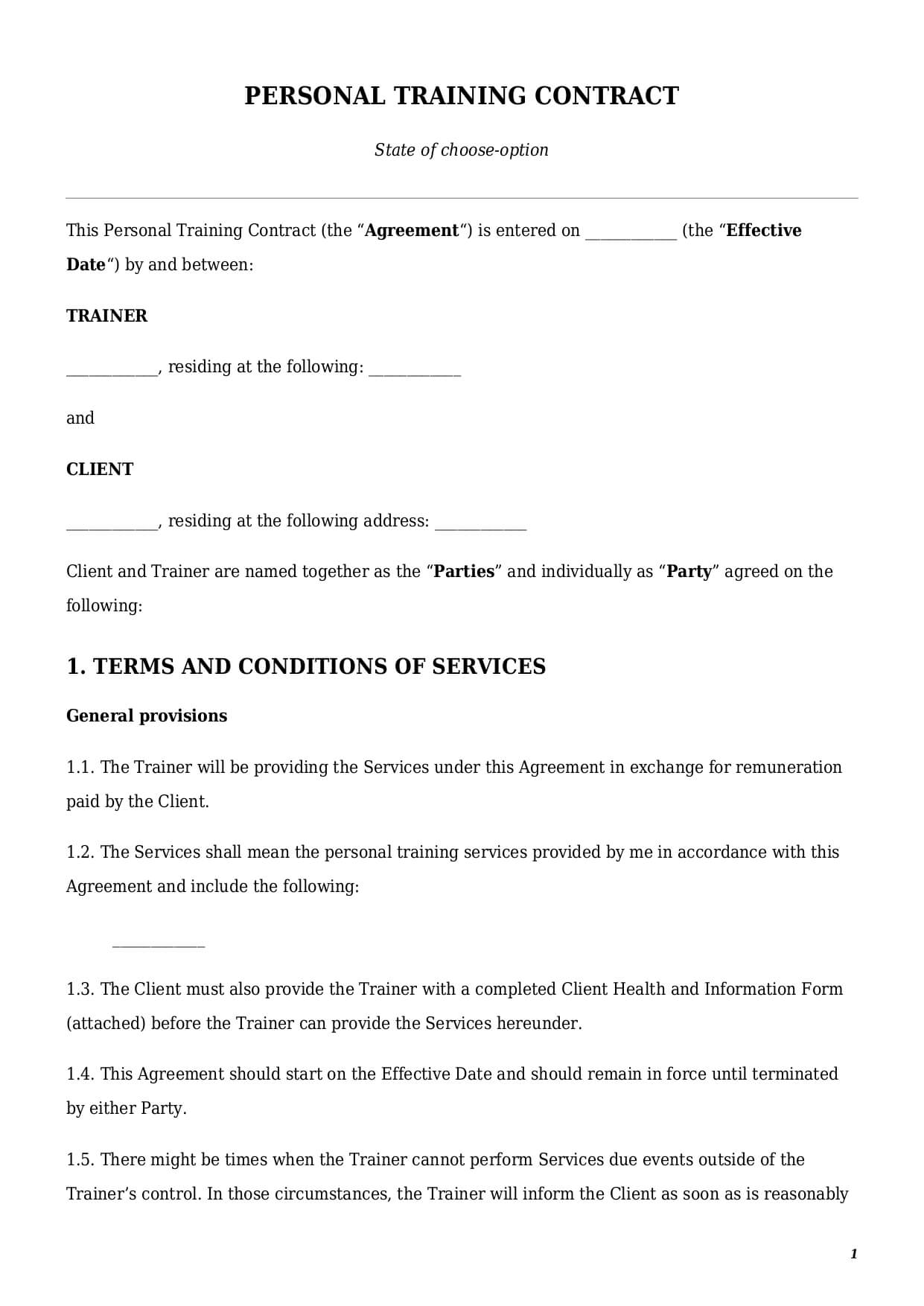Personal Training Contract
Reviews


What is a personal trainer contract?
A personal training contract, also known as a fitness trainer contract, is a legally binding agreement between a fitness professional and a client that defines the framework for the provision of training or fitness services. The document ensures that the parties agree on the key elements below:
- scope of training services;
- reservation of training sessions;
- payment terms;
- limitation of liability;
- health checks; and
- termination clause.
A personal trainer contract is a special type of a general service contract. Under a general service agreement, a service provider delivers certain services to the client in exchange for remuneration. A service provider under a personal trainer contract is a fitness coach who holds a diploma or any other professional certification proving their skills.
A fitness coach activity is not licensed within the United States. At the same time, a fitness coach still needs to possess the respective knowledge to be able to perform trainings. A fitness coach could be a self-employed individual or a gym-employed coach.
A client under a training contract is an individual who is older than 18 years of age and who is willing to participate in training sessions. Before entering a contract, the client should disclose the following information to their trainer:
- any existing medical conditions;
- list of chronic diseases (if any); and
- emergency contract details.
A personal training contract template may provide group training sessions. In that case a text of the agreement should include details of all individuals participating in the training sessions.
There are a number of important considerations parties have to keep in mind while entering a personal training contract:
- Confidentiality policy (i.e., a trainer undertakes to not disclose any information about a client’s health or training);
- Insurance policy (i.e., a trainer should have liability insurance to be able to cover any damage caused to a client during training sessions); and
- Behavior policy (i.e., list of techniques and training practices that are not acceptable during training sessions).
How to draft a personal training contract template?
A good fitness trainer contract template should include all the essential clauses and should be drafted in simple language.
Booking policy
A clear booking policy is a must-have for every personal training contract. This is so because uncertainty with booking terms is the cause No. 1 for all disputes and conflicts.
A booking policy should include the following details:
- booking procedure (e.g., making a phone call, filling out an online form on the website, etc.);
- availability of a trainer (e.g., dates and times on which a trainer usually performs sessions);
- confirmation of a booking;
- cancellation policy (e.g., cancellation after 24 hours before a session is not refundable).
Training details
A well-drafted sample personal training contract should define training details:
- place for training sessions (e.g., online platform, gym class);
- scope of services (e.g., cardio, recovery after injury);
- equipment (i.e., the list of required equipment and who is responsible for its provision);
- duration of the training session.
Payment terms
A good fitness trainer contract template should answer the following questions: how much and how and when the payments should be made. Thus, the parties should include in the contract:
- acceptable payment methods (e.g., cash, PayPal, crypto);
- types of payment fees (e.g., monthly subscription, weekly subscription, fee per session);
- invoicing period (e.g., automatic withdrawals from a bank account);
- refund policy (if any).
A few words should be said about the refund policy. In most of the cases a contract provides a 100% refund to the client if:
- the trainer is not able to perform services;
- quality of provided services is low;
- the trainer provides other services than the services agreed upon by the parties.
Limitation of Liability
Almost all personal trainer contract templates should contain a limitation of liability clause. This clause defines clear legal boundaries of a trainer’s liability in case of a client’s injuries, death, or other serious incidents during training sessions.
As a rule of thumb, a trainer is released from any liability in case of either of the following events below:
- a client’s injury or death caused by a client’s failure to release full details about their medical condition and health history;
- a client’s injuries or death resulting from misuse of equipment or failure to follow instruction.
Termination clause
Every personal trainer contract template should specify how the contract should be terminated. Usually, either party has a right to terminate a contract at any time, provided a prior written notice is sent to the other party. The notice period varies depending on the contract. Neither federal nor state laws define the exact notice period. The parties may agree on 7, 15, or 30 days’ prior written notice.
The contract should also address what happens if there are prepaid training sessions after termination. As a rule of thumb, a client has the right to a 100% full refund of all monies paid for such sessions.
How to customize your fitness trainer contract at Faster Draft?
In order to get your personalized template of a legal document, follow a few easy steps below:
- Click the button “Create Document.”
- Answer simple questions in the questionnaire.
- Select a document’s format—personal trainer contract PDF or Word.
- Make a payment.
- Download your customized document in seconds.
Table of content
Frequently Asked Questions (FAQ)
-
1. How to sign a personal trainer contract template?
Once the template is ready, both parties should sign it. It does not matter if a signature is being put by hand or online using an e-signature tool.
Failure to put signatures on the contract makes a legal document incomplete. As a result, it cannot be enforceable in the court in case of a dispute.
-
2. What is the difference between a coach contract and a fitness contract agreement?
Both documents are examples of a services contract. The difference between them lies in the type of services that are provided to the client.
Under a fitness contract, a trainer provides physical training or workouts to meet certain fitness goals. A trainer under a coach contract delivers to the client certain life, business, or wellness guidelines to achieve their goals.

Looking for something Different?
Start typing to find out our collection of legal documents and contract templates
